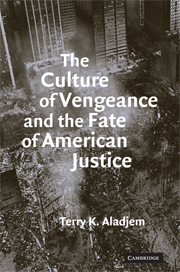2 - Violence, Vengeance, and the Rudiments of American Theodicy
Published online by Cambridge University Press: 05 June 2012
Summary
In a word, the old gods are growing old or are already dead, and others are not yet born.
– Emile DurkheimWhat are we doing when we watch, over and over again, the image of the twin towers collapsing, and the TV returns us inexorably to ‘ground zero’? Is this the compulsion to repeat that Freud recognized in those who suffer mortal trauma? Perhaps, but why do we look within the scene to explain the terror or to find the meaning of ‘evil’? Why does the camera, at first uncertain, seem finally to fix its sights and the one image linger in memory? What is the obsession with the wound, the scarcely suppressed anger of the news coverage, the mournful celebrity telethons for the victims, the return to the scorched earth at the site for each commemorative event? Is this the rage in grief that is so difficult to express? Is it the beginning of our revenge – not of a simple, obvious kind, but the conflicted sort that we have discovered? A symptom, perhaps, of a society that denies vengeance as a matter of its formal justice, but is obsessed with it nonetheless, a secular society that now makes something almost religious of it? Surely it is an attempt to ‘make a memory’ in the way that Nietzsche called to our attention, and to make moral sense of suffering as Weber thought necessary.
- Type
- Chapter
- Information
- Publisher: Cambridge University PressPrint publication year: 2008



